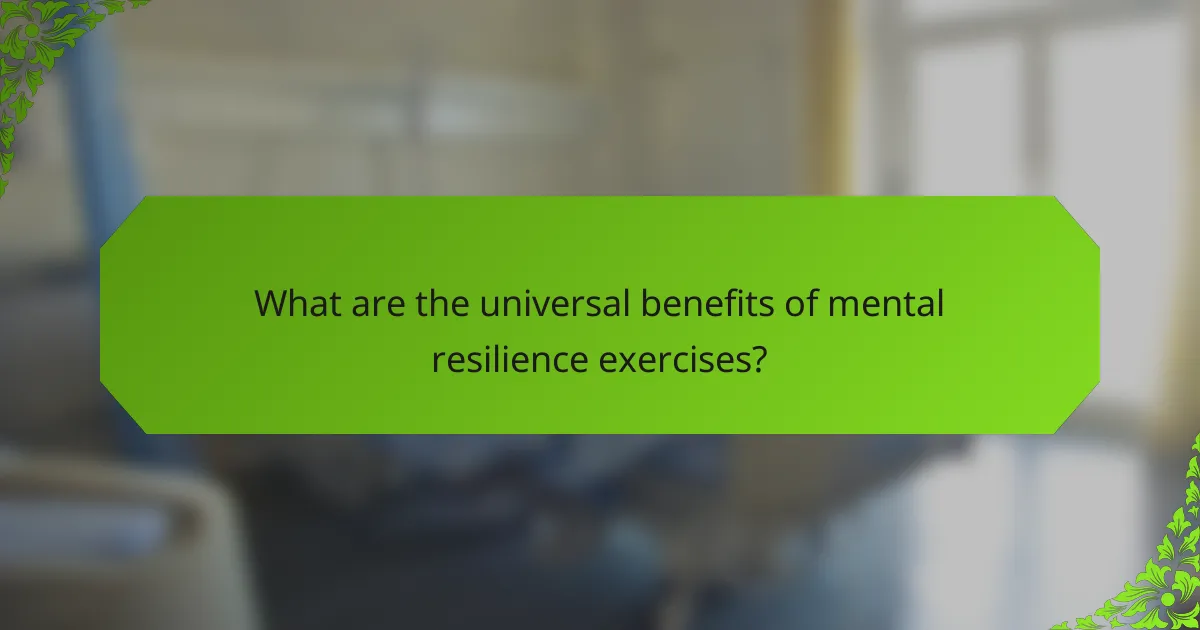Mental resilience exercises are essential for athletes looking to enhance focus, grit, and performance under pressure. Techniques such as visualization, mindfulness, and positive self-talk can significantly improve emotional stability and decision-making. Regular practice of these exercises fosters a growth mindset and aids in recovery from setbacks. Incorporating these methods into training routines can lead to substantial performance gains during competitions.

What are Mental Resilience Exercises for Athletes?
Mental resilience exercises for athletes enhance focus, grit, and performance under pressure. Techniques include visualization, mindfulness, and positive self-talk. Visualization involves mentally rehearsing performance scenarios to boost confidence. Mindfulness practices help athletes stay present, reducing anxiety. Positive self-talk fosters a constructive mindset, improving resilience. Regular practice of these exercises can lead to significant performance gains.
How do these exercises enhance mental toughness?
Mental resilience exercises enhance mental toughness by improving focus, grit, and adaptability under pressure. These exercises, such as visualization and mindfulness, train athletes to manage stress effectively. As a result, they develop a stronger mindset, enabling better performance during high-stakes situations. Engaging in these practices consistently builds emotional resilience, allowing athletes to recover quickly from setbacks.
What role does grit play in athletic performance?
Grit significantly enhances athletic performance by fostering perseverance and resilience. Athletes with high levels of grit maintain focus during challenges, enabling them to push through adversity. Research indicates that grit correlates with success in sports, as it drives consistent effort and long-term commitment. Mental resilience exercises, such as visualization and goal-setting, can effectively cultivate grit, enhancing overall performance under pressure.

What are the universal benefits of mental resilience exercises?
Mental resilience exercises enhance athletes’ performance by improving focus, grit, and stress management. These exercises foster emotional stability, enabling athletes to maintain composure under pressure. Research shows that consistent practice leads to better decision-making during competitions. Additionally, mental resilience promotes recovery from setbacks, reinforcing a growth mindset crucial for long-term success.
How do these exercises improve focus and concentration?
Mental resilience exercises enhance focus and concentration by training the mind to remain present and engaged. These exercises, such as visualization and mindfulness, reduce distractions and improve attention span. As a result, athletes can better manage stress and maintain performance under pressure. Regular practice fosters a unique attribute of mental clarity, enabling quicker decision-making during competitions. Overall, these exercises cultivate a disciplined mindset, crucial for achieving peak performance.
What impact do they have on stress management?
Mental resilience exercises significantly enhance stress management for athletes. These practices improve focus and emotional regulation, enabling athletes to perform under pressure. Techniques such as visualization and mindfulness training help reduce anxiety and increase confidence. Research indicates that athletes who engage in mental resilience exercises report lower stress levels and improved performance outcomes.

What unique practices can boost resilience for amateur athletes?
Practices such as visualization, mindfulness, and goal-setting can significantly enhance resilience in amateur athletes. Visualization helps athletes mentally rehearse performance scenarios, boosting confidence and focus. Mindfulness exercises, like meditation, improve emotional regulation and reduce anxiety, allowing athletes to stay present during competition. Goal-setting creates clear objectives, fostering motivation and a sense of purpose. Incorporating these practices into training routines can lead to improved grit and performance under pressure.
How can visualization techniques enhance performance?
Visualization techniques enhance performance by improving focus, reducing anxiety, and increasing confidence. Athletes can mentally rehearse scenarios, allowing them to prepare for high-pressure situations. This technique builds mental resilience, enabling better reactions during competitions. Research shows that visualization can lead to a 20% improvement in performance metrics. By creating vivid mental images, athletes can reinforce their skills and strategies, making them more effective under pressure.
What are the steps to effectively implement visualization?
To effectively implement visualization, athletes should follow these steps: define clear goals, create a vivid mental image, practice regularly, incorporate sensory details, and evaluate progress. This structured approach enhances mental resilience, improving focus and performance under pressure.
What role does self-talk play in building grit?
Self-talk significantly enhances grit by promoting a positive mindset and resilience. It enables athletes to manage stress and maintain focus during high-pressure situations. Positive self-talk encourages perseverance, helping athletes push through challenges and setbacks. Research indicates that athletes who engage in constructive self-talk experience improved performance and mental resilience. This practice fosters a growth mindset, allowing athletes to view obstacles as opportunities for development.
How can athletes develop positive self-talk habits?
Athletes can develop positive self-talk habits by practicing structured mental resilience exercises. These exercises include affirmations, visualization, and mindfulness techniques that reinforce a constructive mindset.
Affirmations involve repeating positive statements that enhance self-belief. Visualization helps athletes mentally rehearse successful performances, fostering confidence. Mindfulness techniques encourage present-moment awareness, reducing anxiety and promoting focus.
Consistent practice of these exercises can significantly improve mental resilience, leading to enhanced grit and performance under pressure. Research shows that athletes who engage in positive self-talk report higher levels of motivation and reduced performance anxiety.

What rare techniques exist for cultivating mental resilience?
Mental resilience can be cultivated through rare techniques that enhance focus and performance. One such technique is visualization, where athletes mentally rehearse their performance to build confidence. Another method is controlled breathing, which helps regulate stress responses during competition. Mindfulness meditation also plays a crucial role, allowing athletes to stay present and reduce anxiety. Lastly, adopting a growth mindset encourages embracing challenges as opportunities for development, fostering long-term resilience.
How can athletes use journaling to reflect on challenges?
Athletes can use journaling to reflect on challenges by identifying obstacles and tracking their emotional responses. This practice enhances mental resilience, allowing athletes to process experiences and develop coping strategies. Regular journaling fosters self-awareness and promotes a growth mindset, which is essential for overcoming setbacks. Additionally, documenting progress helps athletes maintain focus and motivation, ultimately boosting performance under pressure.
What is the significance of resilience training camps?
Resilience training camps significantly enhance athletes’ mental toughness, focus, and performance under pressure. These camps provide structured environments where athletes practice mental resilience exercises that develop grit and coping strategies. Research indicates that athletes who engage in resilience training show improved stress management and decision-making skills during competitions. The unique attribute of these camps is their focus on practical application, allowing athletes to simulate high-pressure scenarios and learn effective responses. As a result, participants often report increased confidence and a stronger ability to overcome challenges in their sport.

How can amateur athletes apply these exercises in practice?
Amateur athletes can effectively apply mental resilience exercises by integrating them into their training routines. Focus on visualization techniques to enhance performance under pressure. Practice mindfulness meditation to improve focus and reduce anxiety during competitions. Set specific, achievable goals to foster grit and motivation. Engage in positive self-talk to build confidence and resilience in challenging situations. Regularly assess progress to adapt strategies and maintain mental toughness.
What are the best practices for integrating resilience training into routine?
Integrating resilience training into routine enhances athletes’ mental toughness. Start by incorporating short, focused exercises daily, such as visualization or breathing techniques. Schedule regular sessions to assess progress and adapt training methods. Encourage a supportive environment among teammates to reinforce learning. Use performance metrics to track improvements in grit and focus.
What common mistakes should athletes avoid when practicing resilience exercises?
Athletes should avoid common mistakes like neglecting proper goal setting, failing to track progress, and not adapting exercises to their specific needs. Additionally, overlooking the importance of mental recovery and not seeking feedback can hinder resilience development. Engaging in exercises without a clear focus or purpose diminishes their effectiveness.
What expert insights can enhance mental resilience training?
Expert insights that enhance mental resilience training include tailored mental exercises, visualization techniques, and mindfulness practices. These methods foster grit, focus, and performance under pressure. Research shows that athletes who engage in regular mental resilience training can improve their stress management and decision-making skills during competitions. Incorporating feedback from sports psychologists can also provide personalized strategies that address unique challenges faced by athletes, ultimately leading to better outcomes in high-pressure situations.



